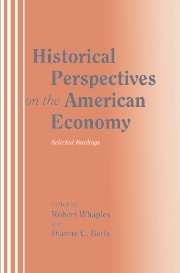Book contents
- Frontmatter
- Contents
- Acknowledgments
- Introduction to students
- Introduction to instructors
- Contributors
- I Introduction
- II Colonial and early national economy
- III Slavery and servitude
- IV The South since the Civil War
- V The rise of American industrial might
- VI Populism
- 15 “A reappraisal of the causes of farm protest in the United States, 1870–1900”
- 16 “The ‘Wizard of Oz’ as a monetary allegory”
- VII Women in the economy
- VIII The Great Depression
- Appendix: Basics of regression
- Glossary
- Name index
- Subject index
15 - “A reappraisal of the causes of farm protest in the United States, 1870–1900”
Published online by Cambridge University Press: 05 June 2012
- Frontmatter
- Contents
- Acknowledgments
- Introduction to students
- Introduction to instructors
- Contributors
- I Introduction
- II Colonial and early national economy
- III Slavery and servitude
- IV The South since the Civil War
- V The rise of American industrial might
- VI Populism
- 15 “A reappraisal of the causes of farm protest in the United States, 1870–1900”
- 16 “The ‘Wizard of Oz’ as a monetary allegory”
- VII Women in the economy
- VIII The Great Depression
- Appendix: Basics of regression
- Glossary
- Name index
- Subject index
Summary
Between 1870 and 1900 American farmers organized in the Grange, the Alliances, and the Peoples (Populist) Party and protested against a variety of economic ills. Economic historians have generally explained the farm organizations and the protests in the same way that the farmers themselves explained them – in terms of low agricultural prices and high costs of inputs resulting in part from the monopolistic organization of the suppliers of those inputs. However, there now exists considerable evidence indicating that the economic conditions of the time were not as the farmers depicted them, thus raising two questions: (1) if the farmers' statements about their economic state cannot be accepted as historical fact, then why were the farmers so angry? and (2) why did they choose to protest the issues which they did?
My purpose in this article is to suggest an explanation of this protest which is consistent with what the farmers said they were protesting and with the evidence that farm economic conditions were not deteriorating. It is not my purpose to introduce new data, but rather to reinterpret data from the standard secondary sources. Furthermore, I am concerned only with the farm protests of the Midwest – the area for which we have the best studies of farm conditions during this period.
The problem of explaining the farm protests
Midwestern farmers said they were being unfairly treated by railroads, moneylenders, manufacturers and retailers of farm equipment, banks, and other “middlemen” who by virtue of monopolistic position and undue influence on government policy were able to deprive the farmer of what should have been his share of rising American income.
- Type
- Chapter
- Information
- Historical Perspectives on the American EconomySelected Readings, pp. 511 - 523Publisher: Cambridge University PressPrint publication year: 1995



